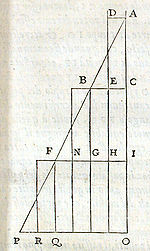
Mean speed theorem
Encyclopedia

Oxford Calculators
The Oxford Calculators were a group of 14th-century thinkers, almost all associated with Merton College, Oxford, who took a strikingly logico-mathematical approach to philosophical problems....
of Merton College and French collaborators such as Nicole Oresme proved the mean speed theorem, also known as the Merton mean speed theorem. It essentially says that: a uniformly accelerated body travels the same distance as a body with uniform speed
Speed
In kinematics, the speed of an object is the magnitude of its velocity ; it is thus a scalar quantity. The average speed of an object in an interval of time is the distance traveled by the object divided by the duration of the interval; the instantaneous speed is the limit of the average speed as...
whose speed is half the final velocity of the accelerated body.
These medieval scientists demonstrated this theorem — the foundation of "The Law of Falling Bodies" — long before Galileo
Galileo Galilei
Galileo Galilei , was an Italian physicist, mathematician, astronomer, and philosopher who played a major role in the Scientific Revolution. His achievements include improvements to the telescope and consequent astronomical observations and support for Copernicanism...
, who is generally credited with it. The mathematical physicist and historian of science Clifford Truesdell
Clifford Truesdell
Clifford Ambrose Truesdell III was an American mathematician, natural philosopher, historian of science, and polemicist.-Life:...
, wrote:
Further reading
- Sylla, Edith (1982) "The Oxford Calculators", in Kretzmann, Kenny & Pinborg (edd.), The Cambridge History of Later Medieval Philosophy.
- Longeway, John (2003) "William Heytesbury", in The Stanford Encyclopedia of Philosophy.

